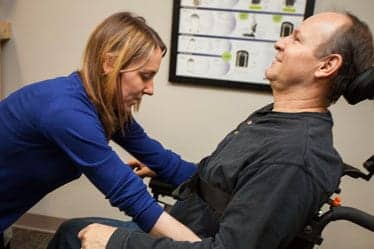The 6-hour, fully accredited online course provides an in-depth review of the clinical guidelines, “Preservation of Upper Limb Function Following Spinal Cord Injury: A Clinical Practice Guideline for Healthcare Professionals.”
From low tech to high tech (eg, from tape measures and stopwatches to the SmartWheel), learn about objective measurement techniques for propulsion training, wheelchair comparison, and equipment configuration. Emphasis is placed on the practical implementation of the guidelines to foster an enhanced standard of care for all people who use manual wheelchairs.
The course provides 6 contact hours of continuing education, which is the equivalent of .6 units. The University of Pittsburgh is certifying the educational contact hours of this program, and by doing so is in no way endorsing any specific content, company, or product. The information presented in this program may represent only a sample of appropriate interventions.
The course presenters are Kendra Betz, MSPT, ATP, and Ron Boninger, BSME, MBA.
To visit to the course registration page, click here. The registration fee is $115.00.
Because of the repetitive stress of daily wheelchair propulsion and transfers, there was a critical need to explore ways to prevent or delay upper limb pain and injury among people with spinal cord injury or disease (SCI/D) who use manual wheelchairs. In response to this need, the Consortium of Spinal Cord Medicine published a new set of clinical guidelines (“Preservation of Upper Limb Function Following Spinal Cord Injury: A Clinical Practice Guideline for Healthcare Professionals.”) that specify methods for the prevention and/or treatment of upper limb pain and injury.
The successful implementation of the guidelines requires effective education of SCI/D health care providers. This was the central focus of this grant, which included onsite education and training sessions with front-line clinical staff in the VA system of SCI/D regional centers and in leading rehabilitation clinics nationwide. The goal of the program was and remains the creation of a concrete, actionable feeling of empowerment among clinicians that will enable them to create an enhanced standard of care for their SCI/D clients, driven by their understanding of the SCI Clinical Practice Guidelines and their implementation. The online course was the direct outcome of this grant-funded project.
Course development was made possible by a 2-year grant from the Paralyzed Veterans of America Education Foundation in May 2006 (PVA Grant #564, entitled, "Preserving Upper Limb Function: Teaching the Clinical Practice Guidelines").
Therapist’s review of the course: "I have completed the modules and think this course is fantastic. I will contact therapists that I know in the Boston area and encourage them to take it. Honestly, I think this should be a required seminar for therapists working in a facility that has a seating clinic or therapist that services individuals that use a wheelchair as a seating and mobility device. I’ll also recommend it to the equipment company that I use because it should be a required seminar for the RTSs and rehab technicians!"
"There are so many helpful hints shared in this seminar, which is what sets it apart from a strictly technical approach. I liked the analogy of a wheelchair as an orthotic device. Thinking of wheelchair propulsion in the same manner as gait analysis also makes sense. I am so thankful that I have this information now and have started to make changes that are critical for the wheelchair user. I can’t thank you enough for this opportunity! My students that use wheelchairs thank you also!"
Deborah Webster, PT, MEd, Boston




